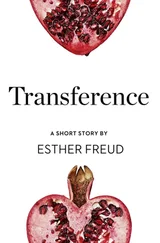It was a small white room with heavy drapes. I looked around for rainbows and freight cars and asked her what of this room she would carry when she left. She said she’d think of the parts of the walls that smelled like smoke and the dried blood she’d scrubbed away from a spot near the door. But also that her memory of the place was not yet formed, that it would take time, that things would come to her later.
Sometimes in the mornings she’d tell me about other rooms.
I had an efficiency in Toronto. A little girl had been raped in the closet. I used to listen to her screams in the walls. You don’t believe me.
I believe you.
I’m not talking about ghosts. I’m talking about things that happened. Things that stay.
Go on. Tell me more.
At first she shrieked for only a few minutes every night. Then she started talking. That lasted longer. She kept me up at night listening to her. Sometimes she still does.
She kissed me. Then she left me in bed and went to work. I stayed there and listened and watched, waited and watched. Under the sweaty covers, I stared at the walls, tried to see laughter, moaning. Dinner-table battles, a slow caress. An old man haunted by fingers letting go of his wrist. Whose fingers? He can’t remember her face. And then it was dark, and I saw a boy in nothing but a light-blue pajama top looking out between the gaps in the blinds at the retreating taillights of his mother’s car. I watch him pull his hands slowly down his cheeks as he stands at the window.
SHE GOES to their tiny country house in the woods with her young daughter, ten days after the sudden death of her husband, and it isn’t the silence but the noise, the wind in the trees, the way the leaves whack the window. It’s fall, the height of fall, and it was a disease that took him with the blank force of a fist pounding on a door in the dead of night. It must have been eating away at him in secret for a long time, maybe even last summer as he worked on screening in this very porch, something she’d never wanted; she always said, Who screens things in? Don’t we have enough of that already? After years of this argument, she’d finally given in, though she insisted she’d sit on the steps, that she’d never drink her coffee in there. Now she remembers what her mother whispered to her at the train station, and she was only trying to be helpful. She didn’t mean it the way it sounded, but her mother had whispered, Don’t lionize him, meaning, You’re young, you loved him, but don’t fall so far into grief when — eventually, her mother didn’t mean tomorrow — there are men who can pull you up. Meaning: Don’t steel yourself out there. And now, standing on the porch he destroyed, it’s the noise that doesn’t have the common decency to wait awhile to begin.
At night she reads while her daughter sleeps. She’s surprised she’s able to concentrate as long as she does. This might have been a book he read, a book he may have even talked about. She can’t remember things like the names of books, the names of people, the names of places. She could never remember the name of one or another town they once loved. You remember? The one with the old guy and the singing dog? Little dog not much bigger than a mouse sitting on his shoulder oooh-oooohing. Used to infuriate him, and he’d seethe, Boone, Boone, North Carolina, in the parking lot of the state park. It was in Boone and the dog’s name was Rudy and the man’s name was Flynn and he kept telling us that his mother had wanted to name him Errol but his father had insisted on Richard. Richard Flynn, the guy with the dog’s name was Richard Flynn. Facts he never forgot. But he couldn’t remember tilts of a head, or impressive sneezes, or the way someone once said yes by doing nothing but breathing quicker. Not for anything could he remember the droop of a chin. She puts the book down because, yes, her mind has wandered like he always said her mind wanders. The light beneath the brown shade reminds her of the dying light she saw out the train window on the way here. They always took the same train at the same time, so she knew the light, the early-November burlap light, and she might have nudged him had he been on the train, the light, and he would have looked at it as if he were seeing it for the first time. She leaves the lamp on, stares at it awhile before half-sleep descends.
THE LANDLORD didn’t know what to do with her clothes. The furniture he could either use or sell, but the clothes, some mothy, others pungent, mildewed, the cheap fur of one of her old coats like a cat he’d seen around a while ago. He puts on a pair of rubber gloves he found under the pipes beneath the kitchen sink, one yellow and one green, and climbs quietly, slowly, up the stairs, as if he’s afraid of waking her. The her who’s already been buried eight days now, at the expense of the county, in the scabbled yard out past Buffom Road, near the industrial park. He wants to run up the stairs and get this over with, but dread yanks him back, dread of opening the accordion doors of her closet. Her smell. She lived up there umpteen years; she always paid her rent on time, sliding it under the door in envelopes with scratched-out return addresses. She never complained about his plumbing, about his insistence on never replacing anything with a new part when an old one would do. For years it had been easy to forget about her. Even though her feet were always peckering around up there. That and the sound of her continually moving furniture. The jolt and scrape of her tugging a bureau across the floor, an inch, then another, then another. She went out two times a day. Once for a walk in the morning and once in the afternoon, down the hill to the L’il Peach for milk or cigarettes or an ice cream bar. The rest of her groceries were delivered. His ex-wife used to go up there and visit with her. After Ellen moved out, that was the end of that. He’d long known he had it coming to him; he never once complained about getting left to the dogs, didn’t lift a finger to stop her when Ellen stood in the kitchen and wrapped exactly half the dishes and glasses in newspaper — but to abandon the old lady? When she was the only person besides the kid down at the gas station who ever talked to her? He’d meant these past two years to mount the stairs himself. He’d meant to go up there and have a chat, as Ellen used to do, maybe even apologize for driving Ellen away, out of her life as well as his, but he never got to it.
Never a louder silence than when you stand in a room where someone lived for many years alone. He looks at the clean walls; she was meticulous, but even so, her smell remains strong. A blend of trapped smoke and what? Jergen’s? Burned butter left crusted on frying pans? Or simply that her body had begun to rot while she was alive up here? She never had many things. Not even a rug in the hall; only a bus schedule for the 112, long out-of-date, thumbtacked to the inside of the front door. (Where did she take the bus? Whom did she go see?) Three rooms: a kitchen, a cramped living room, mostly taken up by a couch that was once yellow but now bleached nearly white by the sun of the uncurtained window, a tiny bedroom made cave-like by the slope of the roof. He stoops and goes into the bedroom. He tries to avoid looking at the bed and fails. It is neat and hand-smoothed, except for a small furrow in the pillow. The afternoon sun has forced its way into this nook. There’s a glint of a spider’s thread reaching from the dresser to the window like a fishing line. Determined to stop lolling over this, he flings open the accordion doors and rams his face deep into the jackets and sweaters and coats and bear-hugs them together. Then he lifts all the clothes, as one, off the rack.
Читать дальше












